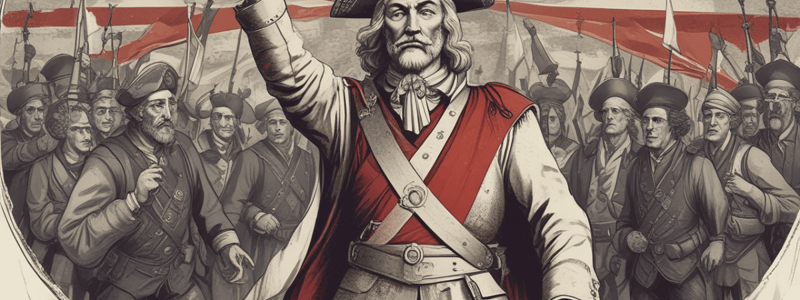Podcast
Questions and Answers
What was the primary reason for James II's downfall in the English Glorious Revolution?
What was the primary reason for James II's downfall in the English Glorious Revolution?
- He was not catholic enough
- He did not implement enough land reforms
- He did not expand civil liberties
- He was too catholic and implemented it into the church (correct)
What was the outcome of the Russian Revolution of 1917?
What was the outcome of the Russian Revolution of 1917?
- The abolition of the monarchy and expansion of civil liberties (correct)
- The granting of a constitution and the establishment of a parliamentary government
- The establishment of a provisional government with a tsar
- The establishment of a monarchical government
What was the primary cause of the Austrian Revolution of 1848?
What was the primary cause of the Austrian Revolution of 1848?
- Rising nationalism and social issues from the Agricultural Revolution
- Widespread discontent with conservative domestic policies (correct)
- Desire for a monarchy
- Widespread discontent with liberal domestic policies
What was the significant impact of the Hundred Years' War on military tactics?
What was the significant impact of the Hundred Years' War on military tactics?
What was the outcome of World War I in terms of technological advancements?
What was the outcome of World War I in terms of technological advancements?
What was the major impact of tanks in World War I?
What was the major impact of tanks in World War I?
What was the outcome of World War II in terms of technological advancements?
What was the outcome of World War II in terms of technological advancements?
What is the primary trend observed in the English Glorious Revolution and the Russian Revolution of 1917?
What is the primary trend observed in the English Glorious Revolution and the Russian Revolution of 1917?
What was the outcome of the US dropping atomic bombs on Hiroshima and Nagasaki in August 1945?
What was the outcome of the US dropping atomic bombs on Hiroshima and Nagasaki in August 1945?
What was the primary goal of the New Deal programs introduced by President Franklin D. Roosevelt in 1933?
What was the primary goal of the New Deal programs introduced by President Franklin D. Roosevelt in 1933?
What was the main purpose of the Statute of Labourers in 1351, following the Black Death?
What was the main purpose of the Statute of Labourers in 1351, following the Black Death?
What was a significant feature of the Popular Front government's social security and welfare systems in 1936-1938?
What was a significant feature of the Popular Front government's social security and welfare systems in 1936-1938?
What was the impact of the economic crises on government policies, according to Trend #3?
What was the impact of the economic crises on government policies, according to Trend #3?
What was the main focus of the Works Progress Administration, one of the New Deal programs introduced by President Franklin D. Roosevelt?
What was the main focus of the Works Progress Administration, one of the New Deal programs introduced by President Franklin D. Roosevelt?
Flashcards are hidden until you start studying
Study Notes
Trend #1: Government Reforms in Response to Social Unrest
- Governments introduce reforms to preserve stability and avoid revolution in response to political pressures and social unrest.
- The English Glorious Revolution (1688): King James II was overthrown due to his Catholic influence on the Church, and William and Mary were invited to take over.
- The Russian Revolution of 1917: Widespread unrest and the overthrow of the Tsarist regime led to the establishment of a provisional government, which initiated reforms such as the abolition of the monarchy and expansion of civil liberties.
- The Austrian Revolution of 1848: Widespread discontent with conservative domestic policies led to the granting of a constitution and the establishment of a parliamentary government.
Trend #2: Wars and Technological Advancements
- Wars speed up technological advancements as countries create new tools to gain military advantages.
- The Hundred Years' War (1337-1453): The significant use of the longbow by the English had a profound impact on military tactics.
- World War I (1914-1918): The war accelerated advancements in weapons technology, including the development of tanks, airplanes, and chemical weapons.
- World War II (1939-1945): The war led to major advances in nuclear technology, resulting in the US developing and using atomic bombs.
Trend #3: Economic Crises and Government Reforms
- Economic crises often force governments to develop new ideas and make changes to help recover their economy.
- Popular Front government (1936-1938): Expansion of social security and welfare systems, including universal healthcare and pension reforms.
- President Franklin D. Roosevelt (1933): The New Deal programs provided immediate relief to those suffering from the Great Depression.
- Black Death (1346-1353): The Statute of Labourers (1351) restricted the mobility of workers and capped wages at pre-plague levels to control wages and prevent labor shortages.
Studying That Suits You
Use AI to generate personalized quizzes and flashcards to suit your learning preferences.




